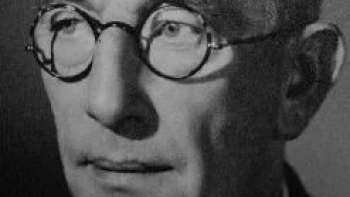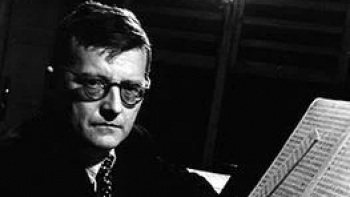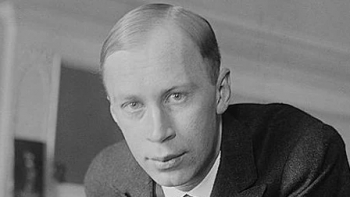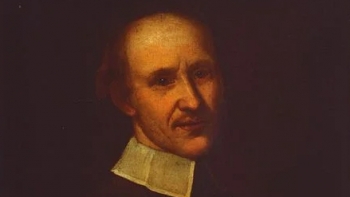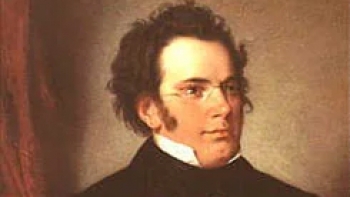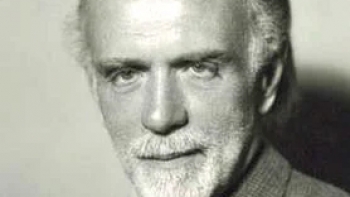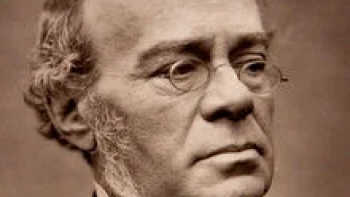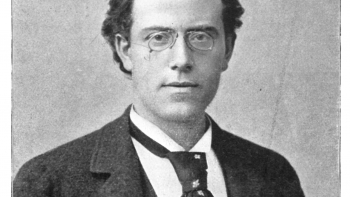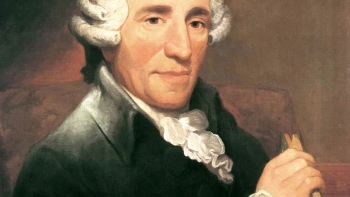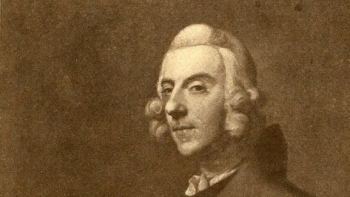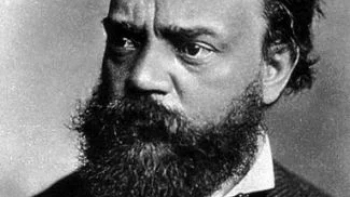Letra Original:
Seis Canções de “A SHROPSHIRE LAD” (UM RAPAZ DE SHROPSHIRE) A.E. Housman
I. Loveliest of TreesLoveliest of trees, the cherry now
Is hung with bioom along the bough,
And stands about the woodland ride
Wearing white for Eastertide.
Now, of my three score years and ten,
Twenty will not come again,
And take from seventy springs a score,
It only leaves me fifty more.
And since to look at things in bloom
Fifty springs are littie room,
About the woodiands I will go
To see the cherry hung with snow.
II. When I Was One-and-TwentyWhen I was one-and-twenty
I heard a wise man say,
"Give crowns and pounds and guineas"
But not your heart away;
Give pearls away and rubies
But keep your fancy free."
But I was one and-twenty,
No use to talk to me.
When I was one-and-twenty
I heard him say again,
The heart out of the bosom
Was never given in vain;
‘Tis paid with sighs a plenty,
And sold for endless rue
And I am two-and-twenty,
And oh, ‘tis true, ‘tis true.
III. Lock Not in My EyesLook not in my eyes, for fear
They mirror true the sight I see
And there you find your face too clear
And love it and be lost like me.
One the long nights through must lie
Spent in star-defeated sighs,
But why shouid you as well as I
Perish? gaze not in my eyes.
A Grecian lad, as I hear tell,
One that many loved in vain,
Looked into a forest well
And never looked away again.
There, when the turf in spring time flowers,
With downward eye and gazes sad,
Stands amid the glancing showers
A jonquil, not a Grecian lad.
IV. Think no more, LadThink no more, lad; laugh, be jolly:
Why shouid men make haste to die?
Empty heads and tongues a-talking Make the rough road easy walking,
And the feather pate of folly Bears the falling sky.
Oh, ‘tis jesting, dancing, drinking
Spins the heavy worid around.
If young hearts were not so clever,
Oh, they wouid be young for ever
Think no more; ‘tis only thinking
Lays lads underground.
V. The Lads in Their HundredsThe lads in their hundreds to Ludiow come in for the fair,
There’s men from the barn and the forge and the mill and the fold,
The lads for the giris and the lads for the liquor are there,
And there with the rest are the lads that will never be old.
There’s chaps from the town and the field and be till and the cart,
And many to count are the stalwart, and many the brave,
And many the handsome of face and the handsome of heart,
And few that will carry their loocks or their truth to the grave.
I wish one couid know them.
I wish there were tokens to tell
The fortunate fellows that now you can never discern;
And then one couid talk with them [friendly ant wish them farewell,
And watch them depart on the way [that they will not return.
But now you may stare as you like and there’s Notting to scan
And brushing your elbow unguessed at and not to be told
They carry back bright to the coiner the mintege of man,
The lads that will die in their glory and never be old.
VI. Is my Team Ploüghing?«Is my team ploughing,
That I was used to drive
And hear the harness jingle
When I was man alive ?
Ay, the horses trample,
The harness jingles now;
No change though you lie under
The land you used to plough.
«Its football playing
Aloog thc river-shore,
With lads to chase the leather,
Now I stand up no more?*
Ay, the ball is flying,
The lads play heart and soul;
The goel stands up, the keeper
Stands up to keep the goal.
«Is my girl happy,
That I thought hard to leave,
And has she tired of weeping
As she lies down at eve?*
Ay, she lies down lightly,
She lies not down to weep;
Your girl is well content. Be still, my lad, and sleep.
«Is my friend hearty,
Now I am thin and pine,
And has he found to sleep in
A better bed than mine?*
Yes, lad, I lie easy,
I lie as lads wouid choose;
I cheer a dead man’s sweetheart
Never ask me whose.
Tradução para Português:
Seis Canções de “A SHROPSHIRE LAD” (UM RAPAZ DE SHROPSHIRE) A.E. Housman
I. A Mais Linda das ÁrvoresA mais linda das árvores, a cerejeira agora
Ostenta flores suspensas nos seus ramos,
E estende-se ao longo do caminho florestal
Vestida de branco para a Páscoa.
Agora, com os meus três vintenas e dez anos,
Mais vinte não haverá,
Para tirar das setenta primaveras uma vintena,
E me deixar com apenas cinquenta.
E já que para olhar para as coisas em flor
São pouco cinquenta primaveras
Pela floresta irei
Para ver a cerejeira coberta de neve.
II. Quando eu Tinha Vinte e UmQuando eu Tinha Vinte e Um
Ouvi um homem sábio dizer,
"Deem coroas, libras e guinéus
Mas não dêem o vosso coração;
Dêem pérolas e rubis
Mas mantenham a vossa fantasia em liberdade".
Mas eu tinha vinte e um,
E ninguém falava comigo
Quando eu tinha vinte e um
Ouvi-o dizer novamente,
"O coração tirado do peito
nunca foi dado em vão;
É pago com muitos suspiros,
e vendido por arrependimento sem fim."
E eu tenho vinte e dois
E oh, como é verdade, como é verdade.
III. Não Olhes Nos Meus OlhosNão olhes nos meus olhos, por medo
Que eles espelhem fielmente o que eu vejo.
E aí encontras a tua face tão nitidamente
E amando-a ficarás perdido como eu.
Tem de se passar as longas noites estendido entre suspiros tão pequenos
ao pé das estrelas,
Mas porque tens tu, como eu de Perecer? Não contemples os meus olhos.
Um rapaz grego, como tenho ouvido contar,
Que muitos amaram em vão,
Olhou para um poço na floresta, E nunca mais desviou o olhar.
Lá, quando o relvado floresce na Primavera, Olhando para baixo com um olhar triste,
Permanece entre os chuviscos resvalados
Um junquilho, não um rapaz grego.
IV. Não Penses Mais RapazNão penses mais, rapaz; ri, fica alegre:
Porque se apressam os homens a morrer?
Cabeças vazias e línguas a falar
Tornam a estrada difícil mais fácil de caminhar,
E a cabeça leve de tolice
Carrega o céu que cai.
Oh é gracejer, dançar, beber
Que faz o pesado mundo rodar,
Se os corações jovens não fossem tão espertos,
Oh seriam jovens para sempre;
Não penses mais: é apenas o pensamento
que enterra os rapazes
V. Os Rapazes às CentenasOs rapazes às vão centenas a Ludlow para a feira
Há homens do celeiro e da forja e do moinho e do curral,
Estão lá rapazes para as raparigas e rapazes para as bebidas,
E ali com os outros estão os rapazes que nunca serão velhos.
Há os companheiros da vila e do campo e da lavoura e da carroça,
E há muitos por contar robustos e muito corajosos,
E há muitos bonitos de cara e há muitos bonitos de coração,
E poucos que levarão consigo para a sepultura a sua beleza ou a sua verdade.
Quem me dera que fosse possível conhecê-los,
Quem me dera que houvesse marcas para distinguir
os companheiros afortunados, que agora não podem ser discernidos;
E então poderia-se falar com eles amigávelmente e dizer-lhe adeus,
E vê-los partir pelo caminho que não hão-de retornar.
Mas agora podes olhar fixamente como quiseres e não há nada para ver
E roçando no teu cotovelo despercebidamente e sem os notares
E levam de volta para o Criador a cunhagem do homem,
Os rapazes que morrerão em glória e nunca serão velhos.
VI. Lavra a Minha Parelha?"Lavra a minha parelha
Que eu costumava guiar
E ouvir os arreios tinir
Quando eu era um homem vivo?"
Sim, os cavalos calcam,
Agora o arreio tilinta;
Nada mudou embora estejas debaixo
Da terra que costumavas lavrar.
"Joga-se futebol
Na margem do rio,
Com os rapazes a perseguirem a bola,
Agora já não me levanto?"
Sim, a bola voa,
Os rapazes jogam com corpo e alma;
A baliza ergue-se, o guarda-redes
Ergue-se para defender a baliza.
"Está a minha rapariga feliz
Que me custou tanto deixar,
Está ela cansada de jogar
Quando se deita ao fim do dia?"
Sim, ela deita-se gentilmente,
Não se deita para chorar;
A tua rapariga está bem contente,
Fica quieto meu rapaz e dorme.
É o meu amigo robusto,
Agora que estou magro e ansioso
E será que já encontrou para dormir
Uma cama melhor que a minha?"
Sim, rapaz eu deito-me e fico imóvel,
Fico deitado como os rapazes gostam;
Eu animo a amada de um defunto
Não me perguntes de qual.
Tradução: Serviço de Música da Fundação Gulbenkian

